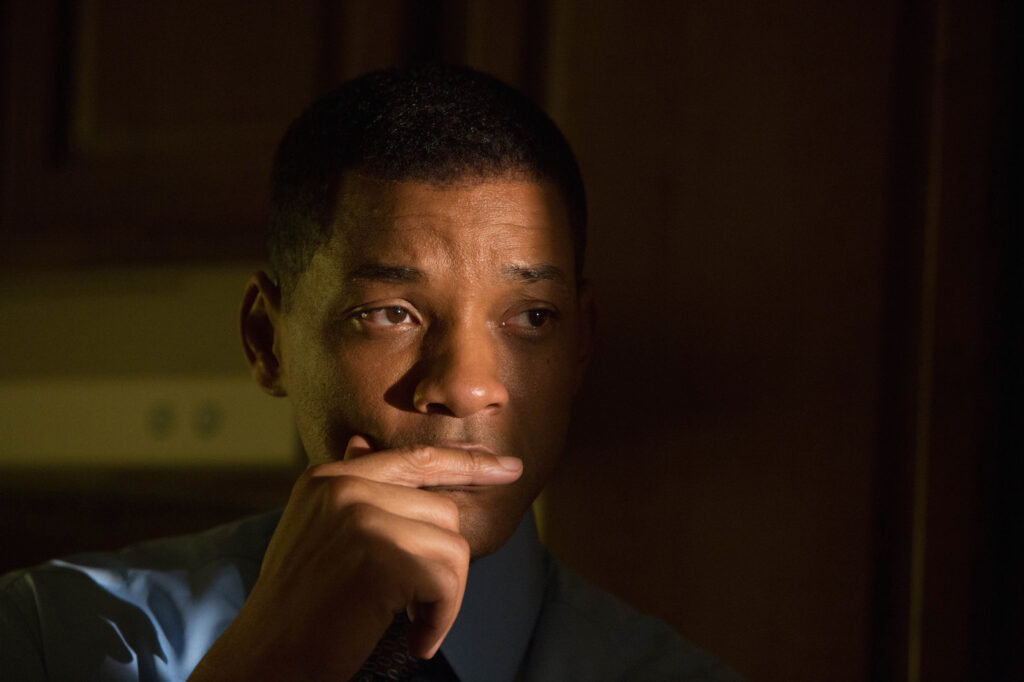Like Monday night’s gala movie, “The 33,” Tuesday night’s gala movie, “Concussion,” at AFI Fest was also based on a true story. Both movies are about men having faith to survive the trials of life, but “Concussion” is the more satisfying of the two although both brought me to tears.
As the title suggests, “Concussion,” which stars Will Smith, is about the medical condition of concussions, and begins by introducing us to the world of professional football via disembodied voices talking about sports and then familiarizing us with Mike Webster (David Morse). For the American football illiterate like myself, Webster’s importance is explained in the movie by showing him giving his Pro Football Hall of Fame induction speech in 1997 where he states it is “the greatest thing to have the opportunity to work with people with a common goal, a single purpose” who are willing to make sacrifices.
For those that need more background, Webster played first for the Pittsburgh Steelers (1974-1988) and then for the Kansas City Chiefs (1989-1990). On retirement, he had played for four Super Bowl winning teams. Before his death, according to the movie, he sold those rings and was living in a truck, huffing Super Glue. Upon his death in 2002, his corpse landed by chance on the table of Dr. Bennet Omalu, a forensic pathologist in Pittsburgh.
Here the Fresh Prince of Bel-Air himself, Will Smith, becomes a prince of Nigeria. Although he’s eventually accused of pulling a scam, Omalu is a man of great curiosity and intelligence. We first see him on the witness stand where when asked about his credentials, he rattles off an awe-inspiring list of eight advanced degrees and certifications. Like the “NCIS” medical examiner Ducky, Omalu speaks to the dead, asking, “Please help me find out how this happened to you.” When he meets the corpse that had been Webster, he’s puzzled as to why the city’s favorite son who is only 50 should turn to self-mutilation and be diagnosed with premature Alzheimer’s. “I can tell something is wrong, but I need some help to tell the world what happened to you,” he explains.
The CT scans show nothing, so he orders extensive. expensive tests and pays for them himself (eventually to the tune of $40,000), suspecting that Webster suffered from a dementia resulting from repeated blows to the head in a similar manner to the already recognized condition of dementia pugilistica, a disease that is seen in professional and amateur boxers. With his studies of Webster, Omalu publishes his findings in the journal “Neurosurgery” with his boss, chief medical examiner, Dr. Cyril H. Wecht (Albert Brooks), and an esteemed colleague at the University of Pittsburgh, the director of the Alzheimer’s Disease Center, Steven T. DeKosky, in 2005. Nonetheless, the victims of chronic traumatic encephalopathy (CTE) begin to pile up (Omalu DeKosky and Wecht authored a follow-up study in 2006). Eventually a former NFL doctor, Dr. Julian Bailes (Alec Baldwin) joins Team Omalu, providing strategic knowledge and inside information about the NFL.
Omalu idealistically believes that the NFL will embrace his studies. Instead, men like Dr. Elliot Pellman (Paul Reiser), the New York Jets doctor and chairman of the NFL’s Mild Traumatic Brain Injury Committee, begin a smear campaign even though Pellman’s actual specialty is arthritis and joint pain, not neurology.
By this time, Omalu is married, to a Kenyan national, Prema Mutiso (Gugu Mbatha-Raw). They are both threatened and harassed, forcing them to leave Pittsburgh for Lodi, California. Prema helps Omalu stay on course, supporting him until his final vindication. She reminds him that Omalu’s full last name Onyemalukwubew means “if you know, come forth and speak.” Omalu did speak up, at great personal and financial cost.
Peter Landesman’s script was based on Jeanne Marie Laskas’ “Game Brain” article, which the real Omalu felt was the first article that humanized him: “That article was a game-changer. Suddenly, people started opening their hearts and minds to me.” Landesman, who also directs, attempts to give a feeling of place. While football may be important to some people, in the city of Pittsburgh it is a major cultural force.
Listening to an actual video of the real Omalu speaking in recent years, Smith might overplay his Nigerian accent, but he does give Omalu a sense of dignity and innocence that comes under pressure when the business of football attempts to crush him. If you are a whistleblower, if you’ve followed the various TV series that feature forensic science, if you have a soft spot for David versus Goliath stories, “Concussion” is just your type of movie.












